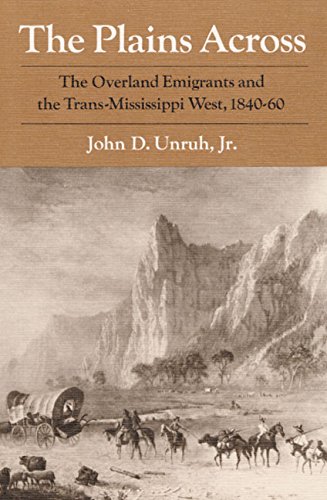John D. Unruh, Jr., The Plains Across: The Overland Emigrants and the Trans-Mississippi West, 1840-60 (Univ. of Illinois, 1979)
 This book grew out of Unruh’s doctoral dissertation, apparently ten years in the making (sadly, he died between the time he finished the book and its publication). His basic argument is that most writing on emigration during the 1840-60 time period is oversimplified. A true understanding of the emigration experience requires (1) an evaluation of how that experience changed over time, (2) and an understanding of how the emigrants interacted with the government, the Native Americans, private entrepreneurs, the Mormons, and each other.
This book grew out of Unruh’s doctoral dissertation, apparently ten years in the making (sadly, he died between the time he finished the book and its publication). His basic argument is that most writing on emigration during the 1840-60 time period is oversimplified. A true understanding of the emigration experience requires (1) an evaluation of how that experience changed over time, (2) and an understanding of how the emigrants interacted with the government, the Native Americans, private entrepreneurs, the Mormons, and each other.
The book is a great read. Thorough and methodical, but at the same time, not dry in the least. Instead of a year by year history, the chapters cover specific areas of impact, such as the subsidiary businesses that sprung up along the trails, the federal support is building roads and forts and escorting emigrants, etc. The chapters add layer upon layer to paint a clear picture of the development of emigration along the central route from a daring, lonely venture in the early-40s requiring guides into a crowded post-gold rush, wagon-clogged slog along a road lined with trading posts offering goods and services.
The author includes to including interesting sections about the eastbound traffic along the emigration routes, the relief expeditions sent out by settlements in California and Oregon to help straggling emigrants, the competition between cities on the Missouri to attract emigrants, the competition between entrepreneurs to coax emigrants to take this or that trail in order to get their business at such ventures as trading posts and ferry services, wintering in Salt Lake City among the Mormons, the emigrant-Indian interaction, which Unruh proves was considerably less violent and more mutually beneficial than usually portrayed.
Really, a wonderful read for anyone who has any interest in emigration during this period.